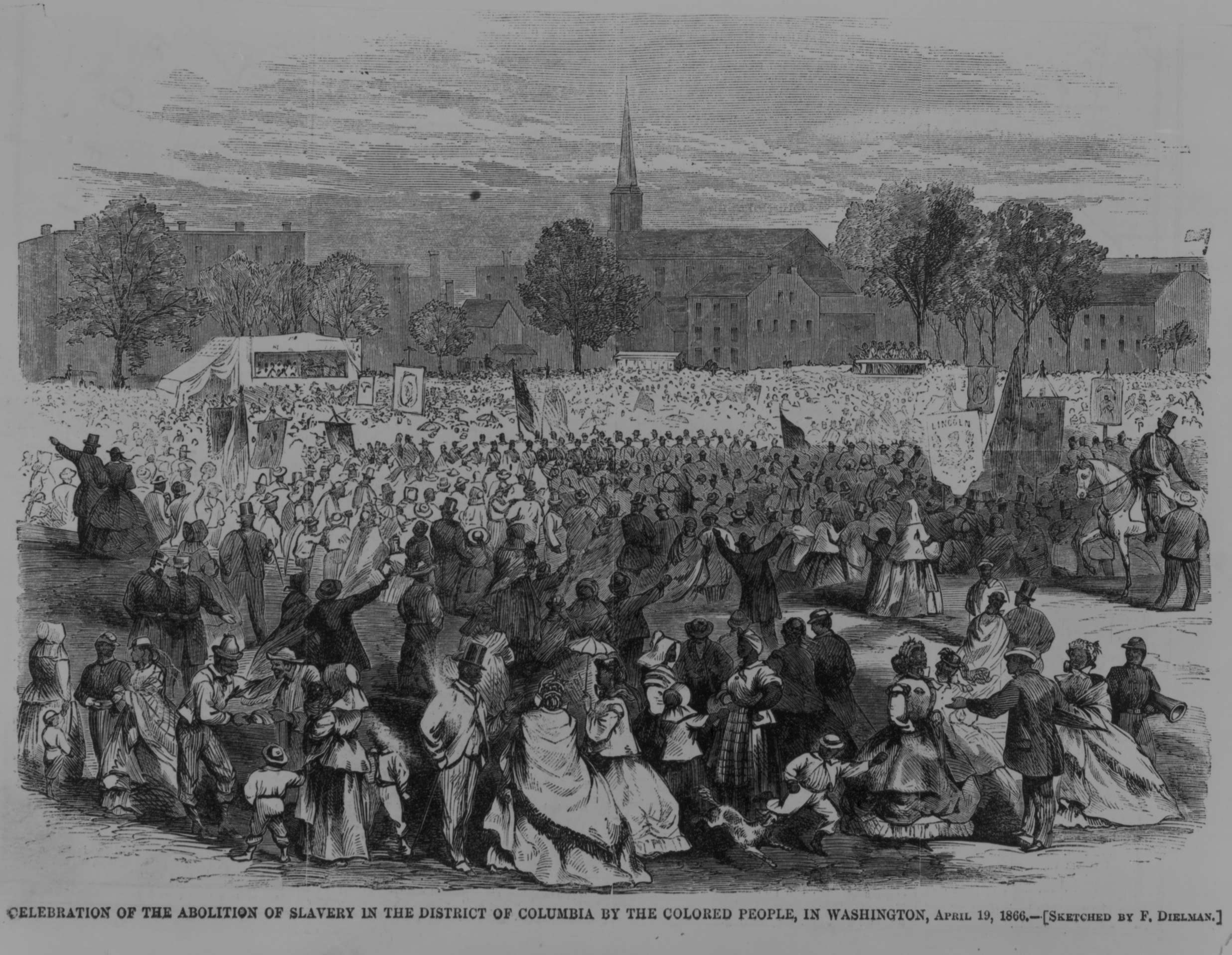The First Independence Day after the End of the Civil War
/Julia Wilbur sewed this flag in the early 1860s. Image courtesy of Charles Lenhart.
July 4, 1865, Washington, D.C.
Recreational activities occurred, at least for Julia Wilbur in Washington, DC--get-togethers, and even fireworks. But the fact this was the first "independence day" post-slavery had particular meaning.
"A Cat May Look at a King"
July Fourth
This image was drawn on Emancipation Day, about 8 months later, but gives an idea of the festivities.
Washington, D.C. Bright, hot. Frances [Julia Wilbur's sister] & I went to the celebration of the colored people on grounds S. of White House. Chronicle says there were 7000 people there. It did seem like a Mass Meeting, of olden times. Mr. Cook (cold.) presided. Wm. H. Day was the orator...His oration was very fine.
Rev. J. Pierpoint read a poem, but I cd. not get near enough to hear a line of it. Sen. Wilson made a good speech. Gen. Gregory & others spoke, but I did not hear them. While this was going on & an eager crowd trying to get and keep within hearing distance, the children of the S. schools & young people generally were enjoying themselves in various ways in other parts of the grounds.
I was well paid for 4 hrs. standing. It was an interesting sight, so many well dressed colored people, & there was right smart of whites too. There was no misconduct. Every body was civil & well-behaved, even the soldiers present behaved themselves. It was for me a glorious Fourth of July. There was not white loyalty enough to have a general celebration. Sen. Wilson hopes there will be enough by another year.
In the evening Frances & I went to see the Fire Works in grounds S. of President’s House. They were under the direction of the Supernt. of the Arsenal. 300 rockets were sent up & 100 shells were exploded, besides the splendid pieces of fireworks. I had never seen such a fine display. A vast number of people assembled to see them. The poor ‘Contraband’ had just as good a chance as any body, for a “cat may look at a king.” The evening was fine.
Per the Evening Star, July 5
The dawn of another Independence Day was ushered in yesterday by the usual firing of guns by men, and rattling of fire-crackers and toy artillery by the children. It did not last long, however, for the young folks and a large proportion of their elder, had arranged for an exodus from the dust and heat of the city to the shady groves in the surrounding country, there to enjoy the day.
The article goes on to describe various fishing and picnic activities, presumably (since race not specified) with a focus on the white population. But the coverage of the celebration that Julia and Frances attended also received respectable coverage:
The Celebration of the National Monument (Colored Association)--This celebration was looked for with considerable interest by both white and colored. ....[A]s early as 10 o'clock the iron seats around the music stand were occupied, and numbers of ladies and gentlemen were seated in the shade upon the mounds or were loitering about the garden inspecting the plants and trees....The stand was handsomely decorated with the national flag, festooned along the front, as the Sunday schools arrived, their handsome banners added to the ornaments...Credit is due the committee of arrangements, who were careful to keep a supply of good ice water convenient to the stand....
The article then highlights some of the notables on the stand and their "orations." Professor Howard Day [full name: William Howard Day, thus both she and the newspaper were correct] gave a little history lesson on this day that commemorates independence from England:
...The speaker would not admit that the fighting qualities of the colored race were only just developed in the late war. In the first struggles of our land for freedom from British oppression the blood of the black man had been poured out, and in 1815, on land and sea, the white and black man had stood side be side in defense of our nation's rights..
Of Missed Poems and Fireworks
One of the things that gives me a kick is when Julia Wilbur's diary is corroborated elsewhere and vice versa. So just as she complains in her diary about not hearing Rev. Pierpoint recite his poem, the Star reported:
Rev. John Pierpoint was introduced by Mr. Cook as an unwavering friend and advocate of human rights. The venerable gentleman had composed a poem for the occasion. Unfortunately, the reader could not be heard far from the stand, and the mass of the adenine did not hear a word, but the laughter of those around the venerable poet, and their applaud, indicated that the poem contained some pungent and humorous hits
It concluded with a description, by name, of each firework shot up in the sky, from "Bengola Lights," to "Pyramid of Roman Candles," to "National Coat of Arms," and ending, appropriately enough, with "Good Night."
p. s. The next day--July 5, 1865, President Andrew Johnson signed an executive order that upheld the convictions of the Lincoln conspirators. The execution took place two days later.


